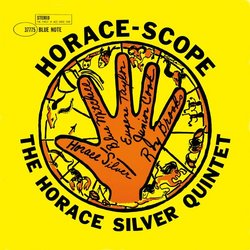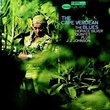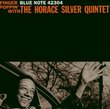| All Artists: Horace Silver Title: Horace Scope Members Wishing: 2 Total Copies: 0 Label: Blue Note Records Original Release Date: 1/1/1965 Re-Release Date: 2/7/2006 Album Type: Original recording remastered Genres: Jazz, Pop Styles: Soul-Jazz & Boogaloo, Bebop Number of Discs: 1 SwapaCD Credits: 1 UPC: 094633777521 |
Search - Horace Silver :: Horace Scope
 | Horace Silver Horace Scope Genres: Jazz, Pop
20 bit digitally remastered. |
Larger Image |
CD DetailsSynopsis
Album Details 20 bit digitally remastered. Similar CDs
|
CD ReviewsMore Sterling Silver Samuel Chell | Kenosha,, WI United States | 06/30/2006 (5 out of 5 stars) "This 2006 reissue appears to be passing beneath the radar screen of many listeners, even though I doubt there's another Horace Silver album with a more infectious, irresistible "grabber." Without so much as a pick-up note, the first measure of the first tune thrusts you into as groovin' a tune as Silver ever wrote: "Strollin'." (If you don't know the tune, I guarantee that it will make you forget "Song for My Father," "Senor Blues," and "The Preacher.") Blue Mitchell and Junior Cook are exceptionally tight on the ensemble passages while complementing one another with their strikingly different solo styles, Mitchell's lyrical lines and smooth, rich sound contrasting with Cook's scorching probes and vibratoless, brambly-edged tone. Blue blows flawlessly throughout, but it's Junior who makes the memorable statements on both "Strollin'" and "Yeah," saving his top tones for the moments when they matter most. Horace is still the catch-phrase, percussive pianist, perhaps at his best when he limits his solo time (his piano solo on "Strollin'" is a curious combination of 'Mairzy Dotes" and "St. Thomas"). What strikes me as most original about his soloing are the bass-note clusters he drops like bombs in his left-hand (an influence from his playing days with Blakey?). Thanks to Roy Brooks (what an underrated drummer!), this session swings as much as Horace's early dates with Blakey. At the same time, the faster, more perfunctory version of "Nica's Dream" on this Blue Note session is a reminder that, though a 5-star Silver offering, "Horace-Scope" is no "The Jazz Messengers," the eponymous 1956 Columbia date that not only features a deeper, more evocative "Nica's Dream" but represents Silver, Mobley, Byrd, Watkins, Blakey and company at arguably their collective, creative best." Your "Horace-Scope:" You Will Buy This CD Michael B. Richman | Portland, Maine USA | 01/21/2001 (4 out of 5 stars) ""Horace-Scope" is another classic recording from arguably the greatest edition of the Horace Silver Quintet. This edition of the pianist's group features Blue Mitchell on trumpet, Junior Cook on tenor sax, Gene Taylor on bass and Roy Brooks on drums, and they certainly made some amazing recordings, from 1959's "Finger Poppin'" to 1964's classic "Song For My Father," where they appeared on half of the album. "Horace-Scope" was cut on July 8, 1960 and contains six stellar Silver songs, including the brilliant "Strollin'" and "Nica's Dream" (which first appeared on Blue Mitchell's "Blue Soul" -- see my review), and Don Newey's "Without You." My reason for giving this album only four stars is it does not quite compare to albums like its five-star predecessor "Blowin' The Blues Away" or its follow-up "Tokyo Blues" (see my review of the latter). However, it is well worth reading this "Horace-Scope."" Your "Horace-Scope:" You Will Buy This CD Michael B. Richman | Portland, Maine USA | 02/15/2006 (4 out of 5 stars) "Of the recent batch of six RVG reissues, Horace Silver's "Horace-Scope" is the most head-scratching release, mainly because the original CD incarnation never went out-of-print and is still readily available, even new on Amazon. Despite this, it is another classic recording from arguably the greatest edition of the Horace Silver Quintet, and great to have in this remastered version. Performing in the pianist's group are regulars Blue Mitchell on trumpet, Junior Cook on tenor sax, Gene Taylor on bass and Roy Brooks on drums, and they certainly made some amazing recordings, from 1959's "Finger Poppin'" to 1964's classic "Song For My Father," where they appeared on half of the album. "Horace-Scope" was cut on July 8, 1960 and contains six stellar Silver songs, including the brilliant "Strollin'" and "Nica's Dream" (which first appeared on Blue Mitchell's "Blue Soul" -- see my review), and Don Newey's "Without You." My reason for giving this album only four stars is it does not quite compare to albums like its five-star predecessor "Blowin' The Blues Away" or its follow-up "Tokyo Blues" (see my review of the latter). However, it is well worth reading this "Horace-Scope.""
|

 Track Listings (7) - Disc #1
Track Listings (7) - Disc #1
